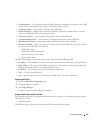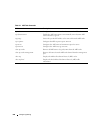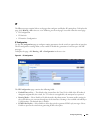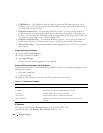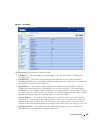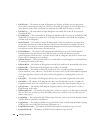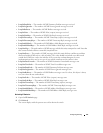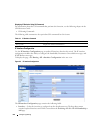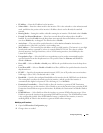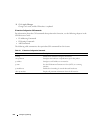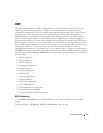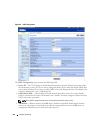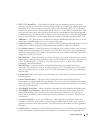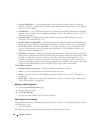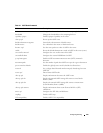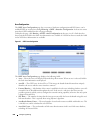
Configuring Routing 513
•
IP Address
— Enter the IP address for the interface.
•
Subnet Mask
— Enter the subnet mask for the interface. This is also referred to as the subnet/network
mask, and defines the portion of the interface's IP address that is used to identify the attached
network.
•
Routing Mode
— Setting this enables or disables routing for an interface. The default value is
Enable
.
•
Forward Net Directed Broadcasts
— Select how network directed broadcast packets should be
handled. If you select
Enable
from the drop-down menu network directed broadcasts are forwarded. If
you select
Disable
they are dropped. The default value is
Disable
.
•
Active State
— The state of the specified interface is either
Active
or
Inactive
. An interface is
considered active if the link is up and it is in forwarding state.
•
MAC Address
— The burned-in physical address of the specified interface. The format is six two-digit
hexadecimal numbers separated by colons, for example 00:06:29:32:81:40. This value is valid for
physical interfaces. For logical interfaces, such as VLAN routing interfaces, the field displays the
system MAC address.
•
Encapsulation Type
— Select the link layer encapsulation type for packets transmitted from the
specified interface from the drop-down menu. The possible values are
Ethernet
and
SNAP
. The
default is
Ethernet
.
•
Proxy ARP
— Select to
Disable
or
Enable
proxy ARP for the specified interface from the drop-down
menu.
•
Local Proxy ARP
— Select to
Disable
or
Enable
Local Proxy ARP for the specified interface from the
drop-down menu.
•
IP MTU
— Specifies the maximum transmission unit (MTU) size of IP packets sent on an interface.
Valid range is (68 to 9198). The default value is 1500.
•
Bandwidth
— Specifies the configured bandwidth on this interface for the OSPF link cost calculation.
This setting does not affect the actual speed of an interface, and the speed of the interface is
communicated to higher level protocols. The valid range is (1 to 10000000).
•
Destination Unreachables
— Select Enable to allow the interface to generate ICMP Destination
Unreachable messages on this interface. Select Disable to prevent the interface from generating ICMP
Destination Unreachable messages on this interface. By default, the Destination Unreachables mode is
Enable.
•
ICMP Redirects
— Select Enable to allow the interface to generate ICMP redirect messages. Select
Disable to prevent the interface from generating ICMP redirect messages. The ICMP Redirect feature
is also configurable globally. If the ICMP Redirect feature is enabled on the interface, it must be
enabled globally in order for the interface to generate ICMP redirect messages.
Modifying an IP Interface
1.
Open the
IP Interface Configuration
page.
2.
Change values as needed.



